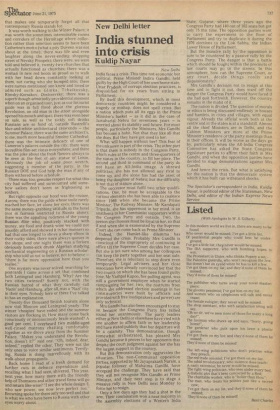New Delhi letter
India stunned into crisis
Kuldip Nayar
New Delhi India faces a crisis. This time not economic but political. Prime Minister Indira Gandhi, held guilty by the High Court of her own home state, Uttar Pradesh, of corrupt election practices, is disqualified for six years from sitting in 'Parliament.
By itself this development, which in most democratic countries might be considered a tragedy or mishap, does not spell crisis. But a nation which puts all its eggs in the Prime Minister's basket — as it did in the case of Jawaharlal Nehru for seventeen years — is worried about its stability and future. For most people, particularly the Ministers, Mrs Gandhi has become a habit. Not that they like all that she does. But they have got used to her.
What will happen without her? This fear of the unknown is part of the crisis. The other part is that there is nobody in the Congress Party, which rules at the centre and three-quarters of the states in the country, to fill her place. The second and third in command of the party do not have an All-India image. A shrewd politician, she has not allowed any rival to come up, and she alone has had the asset of being the daughter of Nehru; but the difficulty is not that of stature alone.
The successor must fulfil two other qualifications. One, he must be acceptable to the various elements she has been able to coalesce since 1966 when she became the prime Minister. The Railway Minister, Mr Kamlapati Tripathi, she has uppermost in her mind, is an anathema to her Communist supporters within the Congress Party and outside. Two, the person she chooses must be loyal to her, so that if and when she is exonerated by the Supreme Court she can come back as Prime Minister.
. Indeed, the Hamlet-like dilemma has deepened the crisis. Probably Mrs Gandhi is conscious of the impropriety of continuing in office till the Supreme Court decides her case. But she is not sure who among her colleagues can keep the party together and her seat safe. Therefore, she is reluctant to step down even temporarily. Legal advisers and her close associates have already convinced her that the two counts on which she has been found guilty (one, Mr Yashpal Kapoo, her polling agent, was still a government employee when he started campaigning for her; two, the rostrums from which she addressed election meetings in her constituencies were built by officials and provided with free loudspeakers and power) are only technical. Mrs Gandhi has also been encouraged to stay on because the Congress Party has rallied round her unanimously. The party leaders either at New Delhi or elsewhere have vied with one another to affirin faith in her leadership and have stated publicly that her departure will be a calamity. This demonstration, though somewhat orchestrated, has pleased Mrs Gandhi because it proves to her opponents that despite the court judgment against her she has the largest support in the country.
But this demonstration only aggravates the situation. The non-Communist opposition parties, supported by Mr Jayaprakash Narain, a popular follower of Mahatma Gandhi, have accepted the challenge. They have said that they will not recognise Mrs Gandhi as Prime Minister, and their next step is to stage a massive rally in New Delhi next Monday to force her to resign.
Only a few days ago they had a shot in the arm. Their combination won a near majority in the Assembly elections of a Western India State, Gujarat, where three years ago the Congress Party had 140 out of 162 seats but got only 75 this time. The opposition parties want to carry the experiment to the floor of Parliament and try to duplicate it during the 1976 elections to the Lok Sabha, the Indian Lower House of Parliament.
But the massive rally by the opposition is sure to be countered by a passive rally by the Congress Party. The danger is that a battle which should be fought within the precincts of law courts may go to the streets. In this atmosphere, how can the Supreme Court, or any court, decide things coolly and dispassionately?
Mrs Gandhi's decision not to resign at this time and to fight it out, does ward off the danger the Congress Party would have faced if she had quit forthwith. However, the country remains in the midst of it.
The nation is divided. The question of morals or ethics is being discussed endlessly in houses and hamlets, in cities and villages, with equal vigour. Already the official work both at the centre and in the states is at a standstill. Almost all the chief Ministers are in Delhi, and the Cabinet Ministers are more at the Prime Minister's residence or the party meetings than in their offices. It will be worse as the days go by, particularly when the All-India Congress Committee has asked the State Congress legislature parties to affirm their faith in Mrs Gandhi, and when the opposition parties have decided to stage demonstrations against Mrs Gandhi.
And hence the crisis. But what is satisfying for the nation is that the democratic system which it has built can withstand shocks.
The Spectator's correspondent in India, Kuldip Nayar, is political editor of the Statesman, New Delhi, and editor of the Indian Express News Service


































 Previous page
Previous page